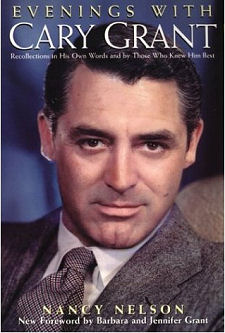Nancy Meyers, the director-writer of The Holiday (Columbia, 12.8), has been totally busted for putting in that Cary Grant-came-from-Surrey line in her film, which I briefly questioned in an item a couple of days ago. I’d always read that Grant was born and raised in Bristol, England, and that he never once lived in Surrey. Since Meyers and a Columbia publicity rep both declined to return calls about this matter on Wednesday, I openly asked if anyone could provide clues to the Grant-Surrey conundrum. This morning a Cary Grant historian named Nancy Nelson, author of “Evenings with Cary Grant,” wrote in with the following:

“You are absolutely right about Cary Grant and Bristol,” Nancy began. “I haven’t seen The Holiday, but from what you say, it’s a silly mistake. Grant’s origins are fairly well known. My book, ‘Evenings with Cary Grant‘, describes in detail his origins, including the interior of the house in which he lived. Starting at age 14, he traveled with a vaudeville outfit (The Pender Troupe) throughout the English provinces. I suppose it’s possible that they stayed in a house in Surrey, but I’m afraid there is absolutely no documentation. (I was the first writer to go through his private papers. I did not miss a thing, believe me.) Even so, a tour stop in Surrey does not warrant ‘Cary Grant came from Surrey.’
“Young Archie Leach traveled with the Pender Troupe to New York at the age of 16. When the Troupe returned to England, he stayed in the United States and made his own way. While he made many subsequent trips to England, he did not take up residence there.
“Responding to one of your emailers: Yes, Cary Grant’s accent is Bristol, cockney from the provinces, and what he called ‘American English,’ which he said he picked up at New York’s Polo grounds. (He was a lifelong baseball fan.) If you put it all together, that’s how you get the Cary Grant accent. Nobody sounds like him.
“Addressing the comment of one of your other responders, I’d like to say that when I give my talks about Cary Grant (‘The Cary Grant Few People Knew’), my SRO audiences are mixed, men and women. And the women represent three generations. Young women today know Cary Grant’s work and have seen his films, and they all want to know how they can meet a man just like him! Which reminds me of the Wall Street Journal reporter who once interviewed Cary when we were in San Francisco (I represented him for his one-man show ‘A Conversation with Cary Grant’), and this young reporter later wrote that Grant was the only male who could inspire lust in every red-blooded American girl …and her mother…and her grandmother.” And she did not say this about him when he was in the prime of his career. He was 80 and she was 24.
“Cary Grant died in Davenport, Iowa, just 20 years ago. November 29 (i.e., next Wednesday) is the anniversary of his death. His presence will always be with us through his films. My book is completely in his words and those of his friends and colleagues. Without conjecture or speculation and with full attribution, it is the most accurate book about him. It is often used as a reference.
“P. S. I will be speaking about Cary Grant at the National Arts Club in New York City on Tuesday, 12.19.06, and at The Metropolitan Museum of Art in New York City on Friday, 6.15.07.”









